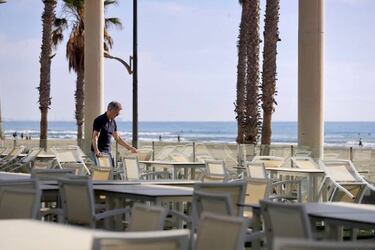What is the current situation with summer holidays during the coronavirus crisis?
UK Health Secretary Matt Hancock has said that holidays abroad may well be cancelled this year, but some countries have started opening up to tourists.

Just over one week ago, UK Secretary for Health and Social Care Matt Hancock admitted that holidaying abroad might not be possible this year – even though some countries such as Italy have announced that they will be reopening their borders. The coronavirus pandemic is far from over and at the moment, flights within Europe’s Schengen Area is largely restricted to essential travel only. That will remain the case until 15 June, but this weekend, several countries announced plans to allow tourists to visit - some from mid-June, others from the start of July.

Is summer cancelled this year?
Back on 12 May, when asked about the chances UK citizens had about holidaying abroad, Matt Hancock told ITV's This Morning, “We haven’t made a final decision but it is clear that we will seek to reopen some hospitality from early July, if we can keep successfully reducing the spread of this virus. But I think social distancing of some kind is going to continue and the conclusion from that is that it is unlikely that lavish, international holidays are going to be possible for this summer. I just think that’s a reality of life”.

Spain PM announces plans for tourism to resume in mid-July
Three days ago, Spain's government extended the state of emergency it has been under since 14 March by another two weeks to 7 June. Spain is gradually unwinding lockdown restrictions with most of the country to enter Phase II of lockdown easing on Monday 25 May. Barcelona, Madrid and Castilla de León, the regions which have been hardest hit by the coronavirus pandemic, will move to Phase I. It is still prohibited for citizens to move between provinces until after Phase III which could be three to four weeks away.
The restrictions on non-essential travel for people coming into Spanish territory remain in place until 15 June – anyone entering the country must undergo a 14-day period of quarantine, during which they will only be able to go out to buy essentials.
However, today, Prime Minister Pedro Sánchez announced that domestic tourism for Spanish nationals will be back up and running from 22 June while international tourism will from 8 July. "There will be a tourist season this year," he said. "Spain will be waiting for you from July, international visitors can now start planning their trip".
Portuguese soak up the sun on first state-sanctioned beach weekend https://t.co/6wdNeCbFPS pic.twitter.com/WD7H7J3e5E
— Reuters (@Reuters) May 23, 2020
Spain’s neighbours Portugal have suffered less during the coronavirus pandemic and are hoping their tourist industry will be back up and running after 15 June. Domestic travel is already allowed and this weekend heralded the first state-sanctioned beach weekend - for Portuguese nationals, on Carcavelos Beach close to Lisbon.
France recently reached an agreement with the UK to ensure that passengers could travel between both countries without the mandatory 14-day quarantine but that has since changed with anyone entering the UK required to self-isolate for two weeks.
Italy relying on tourism to reactivate economy
Related stories
Italy will reopen its borders on 3 June without the need for quarantine as the country, the first to suffer the effects of the coronavirus crisis and one of the worst hit, attempts to regenerate its economy. Prime Minister Giuseppe Conte said reopening the country was the only option left, “We can’t afford to wait until a vaccine is found,” he said this weekend. Three regions: Lombardy, Molise and Umbria will be more closely controlled than other part of the country. Conte admitted that Italy would be taking “a calculated risk, whilst being aware that the contagion curve may rise again".
Other European countries will allow foreign tourists to enter depending on bilateral agreements struck with other countries – for example Croatia has a deal in place with neighbouring Slovenia and Germany and is working on similar arrangement with other EU nations.

